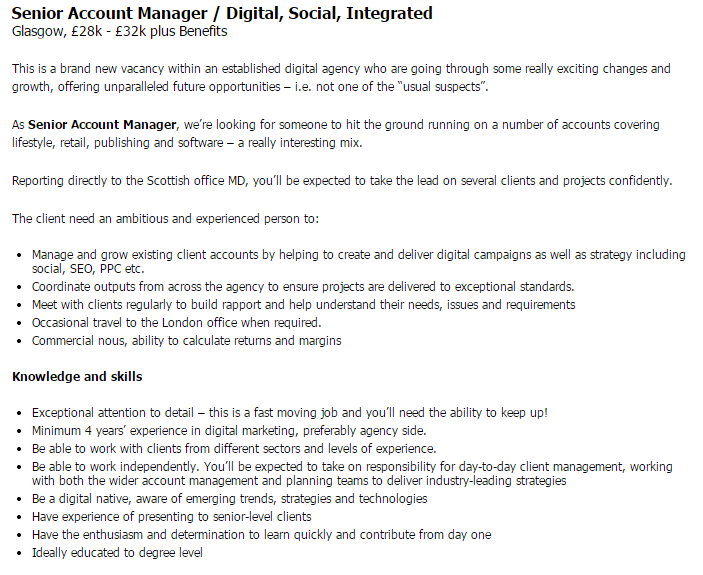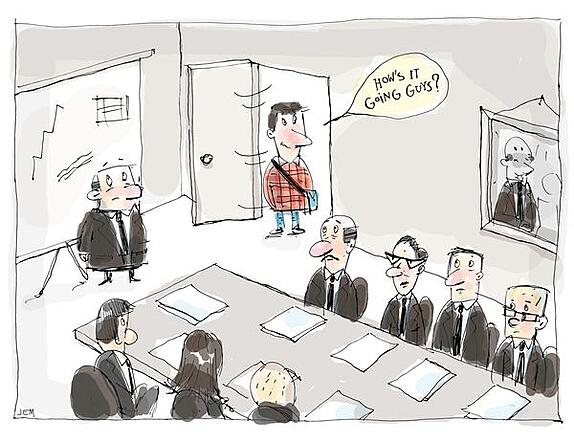Whilst it is important that candidates have the skills to successfully fulfil a job role, I think it is more important that they share the same values and beliefs that exist within an organisation. After all, skills can be developed within the work place, whereas a bad cultural fit will be much trickier to rectify.
As people spend a huge portion of their week within the work place and with colleagues it is beneficial to everyone that the candidate shares the same beliefs and work ethic as the organisation. This will make the work place the most productive and positive environment possible.
Ways in which recruiters can ensure a cultural fit
 To ensure a candidate is a cultural fit you need to know exactly what your client values within their working environment; pin down the key cultural characteristics of their company. This can include:
To ensure a candidate is a cultural fit you need to know exactly what your client values within their working environment; pin down the key cultural characteristics of their company. This can include:
- How the candidate will be working - within a team or individually, within structured working hours or flexi-time, predominantly working behind a desk or being able to get out of the office and travel, within a large or small organisation.
- How the candidate will be managed - whether they'll be given lots of responsibility or be delegated to.
- The general environment of the company - formal or relaxed, high or low pressure.
Prior to interviewing potential candidates, recruiters should make sure that the description of the vacancy includes specifics about their client's working environment alongside the usual skills criteria. Below is a great example of this by Gilchrist Recruitment Partnership:

This advertisement not only explains that the role would be fast paced with some travel and out of office work, but also that it is primarily a role for someone who prefers to work individually. Someone who prefers a much more structured, desk based and relaxed environment would know immediately that this is not a role for them even if they do possess the skills required. Meaning you save time in the long run by not finding this out at the interview!
Whilst interviewing, recruiters should then make sure to ask questions that will tell them explicitly whether the candidate would be a cultural fit. For example, by asking situational questions or open questions which will show the kind of working environment that the candidate thrives in.
The benefits of ensuring a cultural fit
If your client doesn’t prioritise a company culture or ethos, make sure they know the benefits. A candidate that is a perfect cultural fit will create a positive environment for colleagues and generally within the company. A culturally strong team are less likely to break up and their performance rate will be higher as they will all work in harmony with the same values and beliefs in mind. They will also be a true representation of the company.  Furthermore, from a recruiters point of view, clients will be happy and more likely to turn to you again as you will have proved that you know the company inside and out. Save your client's time, as well as your own, by ensuring that you pair candidates and clients correctly by creating a clear person specification and asking the correct questions.
Furthermore, from a recruiters point of view, clients will be happy and more likely to turn to you again as you will have proved that you know the company inside and out. Save your client's time, as well as your own, by ensuring that you pair candidates and clients correctly by creating a clear person specification and asking the correct questions.
The consequences of a bad cultural fit
Cultures can vary wildly from company to company - even within the same industries which require the same set of skills. Whilst you may be used to looking for the same skill sets for each of the industries you recruit for, someone who ticks all the boxes on paper won't necessarily fit into the client's working environment. As tempting as it is to hire the candidate with the most impressive skill set and work experience, neither client, candidate, colleagues, nor the organisation will benefit from a bad cultural fit. The candidate simply won't 'fit in' which can create a negative and unproductive working environment.
Photo Credit: Image 1 & smarnad via freedigitialphotos.net
Kirsty Nimmo
Language and Literature graduate Kirsty loves everything social media related. She's a currently a Marketing Officer based in Glasgow.




